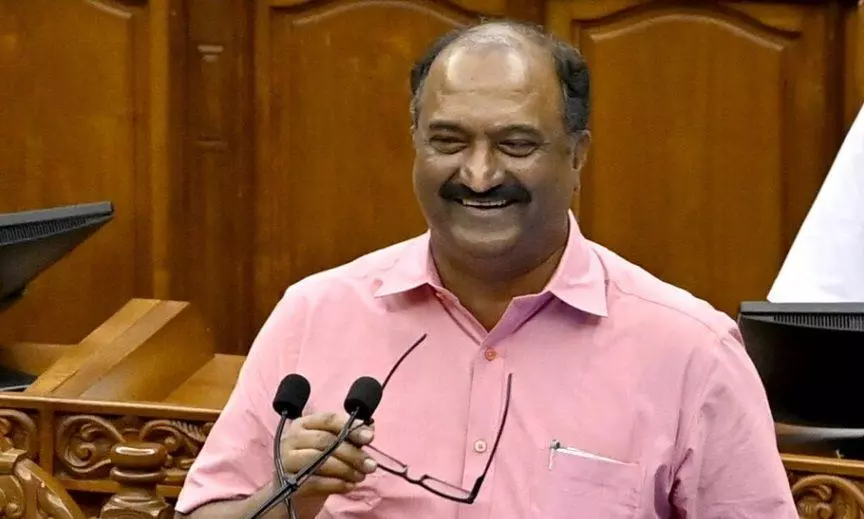
Centre neglect deplorable, but Kerala remains resilient: State FM
With the state budget set to be presented on February 7, Finance Minister KN Balagopal discusses Union Budget’s shortcomings, and Kerala’s economic roadmap

With the Kerala budget set to be presented on Friday, February 7, The Federal spoke to state Finance Minister KN Balagopal. The FM discussed the Union Budget’s shortcomings, Kerala’s economic roadmap, and key focus areas for the upcoming fiscal year. Edited excerpts:
The Kerala government had high hopes from the Union Budget, particularly regarding a special economic package and Wayanad rehabilitation aid. What is your response to these demands being ignored?
It is indeed disappointing. We had submitted a pre-budget wish list, including a ₹24,000 crore special economic package, ₹2,000 crore for Wayanad rehabilitation, and ₹4,500 crore for climate action. However, none of these were considered. The Union Finance Minister speaks of investment and development, but the budget is silent on major projects like Vizhinjam Port, which is crucial for Kerala’s economic growth. This selective approach is unfair to states like ours that contribute significantly to national tax revenue.
Despite this, Kerala is set to receive a higher devolution of Central taxes and duties. Does this offer any relief?
Last year, Kerala received only ₹32,000 crore, whereas, based on population criteria, we should have received ₹73,000 crore. The budgetary increase of ₹4 lakh-crore for states will bring Kerala an additional ₹3,000-₹4,000 crore, but this does not compensate for the massive cuts in central transfers we have faced over the years.
Also Read: Kerala 'survives' only with help from Centre: Union Minister Kurian
Kerala was ranked poorly in NITI Aayog’s Fiscal Health Index 2025. How do you respond to the criticism regarding high spending on social sectors?
The report criticises our spending on education and health, but how can investing in people’s well-being be considered a negative? Kerala has always prioritised human development, and we cannot compromise on our achievements. Unlike many other states, we provide social security pensions and have not reduced government appointments. If our fiscal health ranking is low because of these commitments, so be it. That said, we acknowledge the recommendation to increase revenue and are already among the top states in tax collection.
Given Kerala’s fiscal constraints, will welfare spending and capital expenditure take a hit in the upcoming state budget?
No, we will ensure that both remain intact. Welfare spending is a core aspect of Kerala’s development model, and we will not reduce it at the cost of people’s well-being. At the same time, capital expenditure will continue, particularly in infrastructure and industrial growth. Kerala is on the path to becoming a "sunrise economy," with projects like Vizhinjam Port playing a pivotal role in attracting investment.
Also Read: Kerala requests ₹24,000 crore special package to tackle liquidity crisis
Any new taxation measures on the horizon to boost revenue?
The state government has limitations in imposing new taxes, so we are not planning anything drastic. However, there are certain charges and fees that have remained unchanged for decades. We are considering rationalising these to improve revenue generation without burdening the common people.
There have been reports about KIIFB collecting toll on roads it funds. Can you clarify the government's stand on this?
The Kerala Infrastructure Investment Fund Board (KIIFB) operates on a revenue-generation model, meaning projects should be able to sustain themselves. They are conducting studies on various possibilities, but no final decision has been made regarding toll collection on roads funded by KIIFB. The KIIFB borrows money, which has to be repaid with interest, and there are different models to manage this. However, nothing will be implemented immediately.
Also Read: Fiscal federalism, a casualty of the Modi Era | Budget and the states
What is the government’s plan for rehabilitating Wayanad’s landslide survivors, given the lack of central aid?
The state is fully committed to resettling the affected families in Mundakkai and Chooralmala. Despite the Centre ignoring our request for special assistance, we will persist in seeking aid while ensuring the rehabilitation process continues with our own resources.
Kerala is grappling with human-wildlife conflicts. What steps are being taken to address this?
This is a serious issue that needs joint intervention by both the state and Central governments. We need an overhaul of existing central laws to adopt a more balanced and scientific approach to managing wildlife overpopulation. Without such reforms, the crisis will only escalate, affecting lives and livelihoods.
Experts warn that technological advancements like artificial intelligence will bring major changes to the job market. How is Kerala preparing to tackle this challenge?
Artificial intelligence has immense potential, but it will also lead to job losses. The capitalist society is still figuring out how to address this issue. When 60 per cent of people are left without jobs, we will have to seriously consider the idea of universal basic income. The future of Kerala depends on how we navigate both the opportunities and challenges posed by technological advancements like AI.
Also read: Income-tax break unlikely to boost consumption: Ex-IMF India Rep
Finally, what is your overall outlook for Kerala’s economy in the next decade?
If we maintain our current development trajectory, Kerala will emerge as a premium employment destination, attracting investment and new industries. The confidence in our economic growth is visible, and despite challenges, we are determined to move forward rather than backward.

